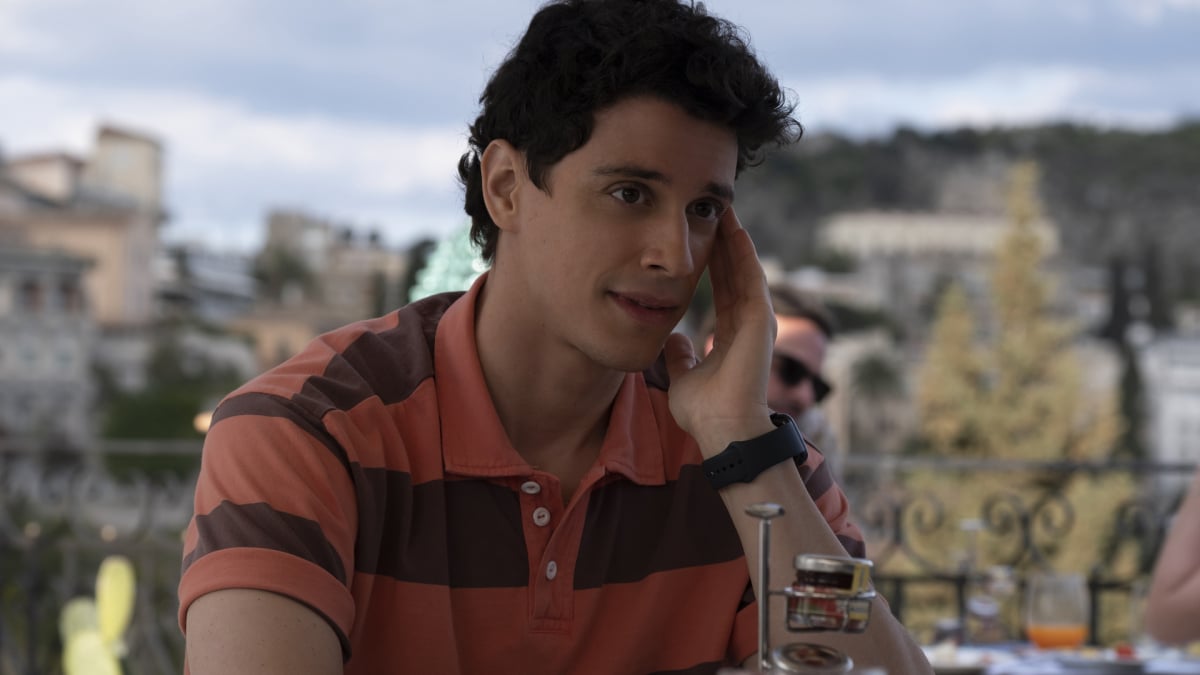Entertainment
Albie from ‘The White Lotus’ and the misogyny of the performative Nice Guy

Likeability isn’t exactly a priority for The White Lotus creator Mike White when it comes to his characters, but each boasts traits that make you root for them one second and curse them the next. Albie Di Grasso (Adam DiMarco) — the certified Nice Guy™ of the show — embodies this dichotomy with some viewers falling for his charms, and others calling out the thinly veiled misogyny hiding behind his performative feminism.
Dragged along by his family for a five-star holiday in Sicily, Albie blew into Taormina with his “nice guys finish last” spiel in Season 2 and somehow manipulated his way into the hearts of the internet. If you have ever been a part of the dating scene, you’ll likely be uncomfortably familiar with the trope of the Nice Guy.
What is a performative Nice Guy?
How can you spot a Nice Guy? Well, they’ll actually tell you. A Nice Guy will constantly bring up the fact that he is, in fact, groundbreakingly nice (as opposed to anything else), believing that showing the bare minimum of respect toward women is deserving of a reward. You’d better believe they’re morally superior beings, often citing allyship to women with very little action to back it up. Directly referenced in Albie’s comments to Portia (Haley Lu Richardson) in episode 2, Nice Guys claim women often go for the “bad boys” and therefore they get left behind — often this type of rhetoric can be found on “incel” Reddit forums where extreme misogyny runs rampant.

Adam DiMarco and Simona Tabasco as Albie and Lucia
Credit: Fabio Lovino/HBO
Albie has displayed almost every single sign of a Nice Guy throughout Season 2 of the show — giving himself the literal title, saying he’s attracted to “wounded birds”, demonstrating his saviour complex with his relationship with Lucia (Simona Tabasco), and so on.
In episode 2, when Portia asks him if he is a “nice guy” in relationships, Albie says: “Girls are always complaining that guys aren’t nice, but then, if they find a nice guy they’re not always interested.” It is a truth universally acknowledged that if you have to say you’re a Nice Guy, you most definitely are not a nice guy.
Portia picks up on Albie’s niceness, but it appears she believes him to be genuinely nice, not performatively nice. In episode 3, Portia tells Tanya: “He’s really nice, like, maybe a little too nice. I wish he’d just cut my heart right up a little bit more or something.” These words feed straight back into Albie’s belief that women aren’t typically interested in “nice” men.
The Nice Guy trope is accompanied by a sense of entitlement to women’s time, attention, and, more often than not, sex, a routine that’s nothing but an often successful manipulation tactic. Nice Guys are heavily motivated by the prospect of passively pleasing the object of their desire (usually a woman) into a relationship and/or sex.
It is a truth universally acknowledged that if you have to say you’re a Nice Guy, you most definitely are not a nice guy.
There is a certain level of arrogance and lack of self-awareness in assuming that the only grounds a person could possibly have for rejection are someone being too nice. And the roots of this trope have had a severe impact on the dating culture of today.
“Men who complain that they are unlucky in love despite their ‘nice guy’ persona may have a sinister agenda,” journalist Rachel Hosie writes for the Independent. “The idea is that if you meet someone’s needs without them having to ask, they should meet yours. Ergo, if a man is nice to a woman, she should repay him by becoming his girlfriend, because that’s obviously how these things work.”
Albie wants to rescue ‘pretty, wounded birds’
Albie’s saviour complex will be his ultimate undoing in The White Lotus. He tells Portia that he is attracted to “pretty, wounded birds,” which makes it seem like he only wants to be with women who require some kind of rescuing. With Lucia, he gets to act the “hero” and “save her” from the mysterious threat of Alessio, not necessarily just for Lucia’s sake, but to make him feel better about himself.
Albie’s response to discovering Lucia is a sex worker is also very telling. Albie assumes Lucia, as a sex worker, has no agency and can’t possibly believe that she is doing this by choice. He is all too willing to assume she is being exploited by Alessio, a man she implies is her pimp. He firmly believes she is being exploited, that she is a victim, and therefore needs rescuing. His saviour complex also comes into play here. He sees Lucia as the “wounded bird” he mentioned earlier. So when Lucia uses this to her advantage and scams Albie out of €50,000 by making up the whole story about Alessio, it doesn’t come off as that much of a surprise.
This is a moment that serves as the turning point in Albie’s Nice Guy routine. We don’t get to see this in the show, but it perfectly sets up the beginning of his distrust of women, which could lead him right down the path that he so badly wants to avoid. At the airport, when everyone is finally getting ready to go home, the three Di Grassos all turn their heads to look at a beautiful woman who is walking past them, implying that Albie is going to turn out exactly like them.

Adam DiMarco, F. Murray Abraham, Michael Imperioli star as three generations of Di Grasso men.
Credit: Fabio Lovino/HBO
Albie’s performative feminism is demonstrated throughout the series, mainly driven by his need to distinguish himself from his father and grandfather — he tells Portia, “I refuse to have a bad relationship with women.” In episode 3, when the Di Grassos and Portia visit the house where they filmed scenes from Francis Ford Coppola’s The Godfather (1972), Albie goes on a rant that the movie is loved by men because it sells them the fantasy of a time when the patriarchy was rarely challenged. Albie keeps looking at Portia as if he’s checking to see if she’s impressed by his lifted-straight-off-a-Twitter-thread feminist monologue that rejects traditional male gender roles.
“Men love The Godfather because they feel emasculated by modern society. It’s a fantasy about a time when they could go out and solve all their problems with violence, and sleep with every woman, and then come home to their wife who doesn’t ask them any questions and makes them pasta,” he says.
Albie’s entire Godfather monologue is also a reaction to his father and grandfather’s string of infidelities. He seems to blame them both for the way he is now, which is a pattern also visible in his father, Dominic.
“You know the reason I am the way I am is because of you,” he tells Bert, “You never showed me how to love a woman…how to be intimate…how to put others first. You always put yourself first, so I did the same thing.” Albie is trying so hard to not end up like the men in his family that it seems like his Nice Guy act will lead him to overcorrect his behaviour and wind up exactly like his predecessors.
If Albie’s feminism had felt less performative, less rehearsed, and instead came from a more genuine place, then this scene wouldn’t have raised an eyebrow, but there’s an element of reward-seeking in his behaviour.
The sexual currency of performative feminism
Over the years, claiming to be a feminist and understanding the oppression marginalised genders face has become a sexual currency in our dating culture. Research shows that a person’s stance on social issues could make or break a match. According to Tinder’s 2022 year in review, 75 percent of single people are looking for a match who is respectful of or invested in social issues.
Another survey conducted by Bumble found that 74 percent of men say they’ve looked inward and analysed their own behaviour more than ever and have a clearer understanding of toxic masculinity. Research conducted by PhD candidate Max Stick revealed that men who identify as feminists end up having more sex than the men who don’t.

Haley Lu Richardson as Portia and Adam DiMarco as Albie.
Credit: Fabio Lovino/HBO
Albie’s performative feminism comes under scrutiny again when Jack enters the picture. During the beach club scene in episode 4, Albie is clearly agitated that Portia is talking to Jack, who is the literal embodiment of a walking, talking red flag — the “Cowabunga” tattoo, the stereotypical “bad boy” charm, the blatant disregard of Portia’s needs. Albie has trouble trying to understand why a woman who he has been courting for barely two days suddenly does not want to hang out with him. He seems to think he has some sort of ownership over her — I saw her first, so she is mine. He is also threatened by Jack because it solidifies his belief that girls go for “bad boys” and not “nice guys.”
Sexual politics has replaced white privilege in Season 2 of The White Lotus. Where the first season was set against the backdrop of the disputes in the colonial land on which the hotel (whose name is not an accident) sits, this second season sees people use their sexuality to wage war on everyone around them. In this season, sex is a weapon, a means to control and assert power, and its byproduct (particularly when the sex is extramarital) is hurt and suffering to the person being cheated on.
There is feminism and there is performative feminism. The latter exists because there is a social, romantic and sexual currency attached to it. It is very easy to masquerade as one because of how much the conversation around this has been democratised. Instead of making a genuine commitment to feminism, complete with tangible actions to back them up, Nice Guys like Albie use it as a manipulation tactic to get women into bed, and therein lies the problem.
Nice guys get the girl. Nice Guys™ don’t.
-

 Entertainment7 days ago
Entertainment7 days agoSummer Movie Preview: From ‘Alien’ and ‘Furiosa’ to ‘Deadpool and Wolverine’
-

 Entertainment6 days ago
Entertainment6 days agoWhat’s on the far side of the moon? Not darkness.
-

 Business6 days ago
Business6 days agoHow Rubrik’s IPO paid off big for Greylock VC Asheem Chandna
-

 Business7 days ago
Business7 days agoThoma Bravo to take UK cybersecurity company Darktrace private in $5B deal
-

 Business5 days ago
Business5 days agoTikTok faces a ban in the US, Tesla profits drop and healthcare data leaks
-

 Business5 days ago
Business5 days agoLondon’s first defense tech hackathon brings Ukraine war closer to the city’s startups
-

 Business7 days ago
Business7 days agoZomato’s quick commerce unit Blinkit eclipses core food business in value, says Goldman Sachs
-

 Business6 days ago
Business6 days agoPhoto-sharing community EyeEm will license users’ photos to train AI if they don’t delete them




























